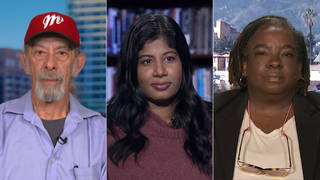
Guests
- Lori Wallachdirector of Public Citizen’s Global Trade Watch.
The Senate passed legislation today that would remove all trade barriers between the United States and Jordan, after the Bush administration persuaded a pivotal Republican senator to drop his objections. Meanwhile, in a speech on Monday to the Institute for International Economics, Robert B. Zoellick, the United States trade representative, encouraged Congress to grant the president fast-track authority. And Alan Greenspan, the Federal Reserve chair, told the Senate Banking Committee last week that the United States should use the outpouring of international support to develop support for a new round of global trade talks.
Transcript
AMY GOODMAN: The Senate passed legislation yesterday that would remove all trade barriers between the United States and Jordan, after the Bush administration persuaded a pivotal Republican senator to drop his objections. Meanwhile, in a speech Monday to the Institute for International Economics, Robert Zoellick, the U.S. trade representative, encouraged Congress to grant the president fast-track authority. And Alan Greenspan, the Federal Reserve chair, told the Senate Banking Committee last week that the United States should use the outpouring of international support to develop support for a new round of global trade talks.
We’re joined on the line from Washington by Lori Wallach, director of Public Citizen’s Global Trade Watch. Your response to these moves?
LORI WALLACH: This is some of the most crass political profiteering I have ever seen in all the years I’ve been in Washington. Basically, Zoellick and the chairman of the Ways and Means Committee, a guy named Thomas from Illinois, have gone on a personal mission to abuse the tragedy to try and further their special interest agenda, knowing that the huge outpouring of opposition from across the country to fast-track more NAFTA expansion had basically put their plans on ice. They’re now using a rally-around-the-flag approach.
Zoellick, in just the most disgusting speech I may have ever read, announced that there were direct links between the protesters against globalization and the terrorists who blew up the World Trade Center, and, further, gave it “You’re with us, or you’re with them,” “them” being folks who aren’t for fast track. It’s really — the only upside about this, because it’s so tawdry, it’s so unseemly, it’s so depressing, that members of Congress have found it repulsive, as well, and a backlash is growing. But there really is what I would call a stealth attempt to use what is a standdown by all of the critics of fast track, because the Congress and the country is focused on the crisis, and these special interests are trying to exploit that to push what would otherwise be a hopeless agenda.
AMY GOODMAN: So how are you mobilizing against it?
LORI WALLACH: Well, it’s really important, actually, for people to start calling their members of Congress again. And the irony is, they need to do it very delicately, because it’s the other side that’s been so crass and tawdry. We don’t want to be like them. So, the message needs to be — and folks need to do this immediately — this isn’t the time for this debate. This is a very contentious debate. Fast track, specifically, and globalization, generally, are amongst the most contentious issues. And we need that debate, and we’re eager for it, but now is not the time, because, in fact, the Congress needs to focus on, immediately, the many people whose lives and jobs and homes have been destroyed by the crisis, needs to figure out how to avoid future attacks, and this is the kind of issue that would just blow apart any possibility for Congress to work on those short-term issues. And that is the message that folks need to make to their members of Congress, with a footnote of saying, “And by the way, if the other side wants to really push this and cause this horrible divisiveness right now, of course, we will passionately fight, and we will win. But it’s not necessary. It’s the wrong time. It’s the wrong tone. We can deal with it later. It’s a fight we need to have, but not now.”
AMY GOODMAN: Finally, Phil Gramm of Texas’s opposition to the trade agreement with Jordan, what’s your assessment of the agreement and why he opposed it?
LORI WALLACH: He opposed the agreement because the agreement has the first modest steps towards putting environmental and labor language in the core text of a trade agreement. And the Jordan agreement is, in fact, a very modest step in that direction. It is not anything vaguely like the basis for future trade agreements or for a model to come out for fast track. And Gramm opposed even those modest steps, whereas the great consensus of, frankly, almost all the Democrats, including those who in the past have supported trade agreements that environmental and labor and consumer groups opposed, is that, in fact, future trade agreements must, in their core text, have much better provisions for human rights and labor and environment and democracy and food safety, and that the Jordan agreement, while a step in the right direction, is no model. But the Republicans are so extreme against anything but trade über alles, that Gramm was putting up a fuss.
AMY GOODMAN: Lori Wallach, I want to thank you for being with us, director of Public Citizen’s Global Trade Watch.













Media Options